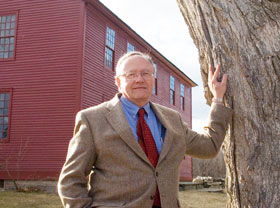  |
| HOME | THIS ISSUE | CALENDAR | GRANTS | BACK ISSUES | < BACK | NEXT > |
Fenimore Cooper expert to head American Studies programby Scott Brinckerhoff - April 10, 2006 |
||||
|
For those whose acquaintance with James Fenimore Cooper is limited to a long-ago reading of The Last of the Mohicans or the Oscar-winning 1992 movie of that novel, consider this:
All this and more is among the knowledge imparted by one of the nation’s foremost experts on Cooper, Professor Wayne Franklin, director of UConn’s American Studies program. Franklin, a Guggenheim Fellow whose new biography of Fenimore Cooper will be published early next year by Yale University Press, has much in common with his subject. Both reflect a wide range of interests that revolves around ordinary people. Though Cooper moved easily in high society, his politics were firmly with the Jacksonian Democrats. Franklin, meanwhile, conducts much of his research using materials from average citizens of the colonial and antebellum eras. As Franklin puts it: “I’m interested in what some people describe as the ugly and the ordinary, as well as the beautiful and the rare. What sort of houses did our ancestors live in? Why did they shape the landscape as they did? How did they write about their experience, and why?” It might be easier to catalog what Franklin isn’t interested in, given the span of his past writing: everything from outdoor signs to dogs, botany, folklore and carpentry. Franklin, who came to UConn last year from Northeastern University and before that, the University of Iowa, says his biography will add to what historians know about Cooper’s finances, legal affairs and health. To fill in these knowledge gaps, Franklin has spent years poring through handwritten and often nearly illegible Cooper family records. In the process, he acquired trifocals. Though the novelist’s origins in upstate New York were humble, Franklin says, Cooper’s father was quite the land baron. He left each child a legacy supposedly worth $50,000, an impressive sum in 1809. But, as Franklin explains in his book, the father’s estate was burdened with debt, and the value of the land inherited by the children along the New York-Canada border fell. Young James found himself in debt, too, and he engaged in several financial misadventures, including the frontier store and buying and outfitting a whaling ship. Then he launched an even more outrageous career, at least by the standards of the day: He became a writer. “Even thinking that he could write books and make money from them was an astonishing thought in the United States in 1820,” Franklin says. After a false start in which he tried to emulate Jane Austen, Cooper made a great deal of money in the 1820’s.
Unfortunately, when he became a champion of democratic principles during a long stay in Europe, he became a frequent target of reactionary newspaper publishers. “Cooper’s support of democratic movements in France and Britain led papers that favored the oligarchs to attack him, often by using a review of one of his books as a pretext for the attack, Franklin says. “Cooper sued the editors for libel, argued most cases himself, and won them all, too.” Both in his teaching and study of Cooper, Franklin always peers behind events to put them in context. For example, Cooper’s newspaper battles took place at a time when freedom of the press was a new concept that publishers and readers alike were assessing as they went along. Franklin places Cooper’s attitudes toward the volatile issue of slavery against the background of the great changes taking place in African American communities in New York State in the early 19th century. In the classroom, Franklin’s students are exposed to the writing of ordinary people as well as to well-known authors. In a senior seminar on “Remembering the Revolution,” students each produce a research paper based on pension files from the federal government, circa 1818. Two nursing students gathered material from the file of a surgeon’s mate to learn what medical care was like then; another explored the role of African American soldiers, and what became of them as veterans. The students also read a memoir by Joseph Plumb Martin, a 16-year-old soldier in the Continental Army whose work is regarded as one of the best soldier-level accounts of a war ever written. Franklin believes his courses help students develop the capacity for critical thinking. “Education isn’t about mass-producing people who all think the same,” he says. “To understand the complexities of today’s world, it’s helpful to probe the experiences of ordinary Americans in seemingly ‘simpler’ times.” Indeed, part of the appeal of an American studies curriculum may lie in its ability to offer something to almost anyone, regardless of background or career aspirations. Anthropology, business, law, political science, and the environment are only some study areas within the curriculum. “We ask questions that cross disciplinary boundaries and tie disparate subjects together,” Franklin says. “Our students end up with a broad grounding in a number of fields, opening doors to everything from teaching ‘public history’ at facilities like Old Sturbridge Village, to careers in law, politics, or journalism.” |
| ADVANCE HOME UCONN HOME |

